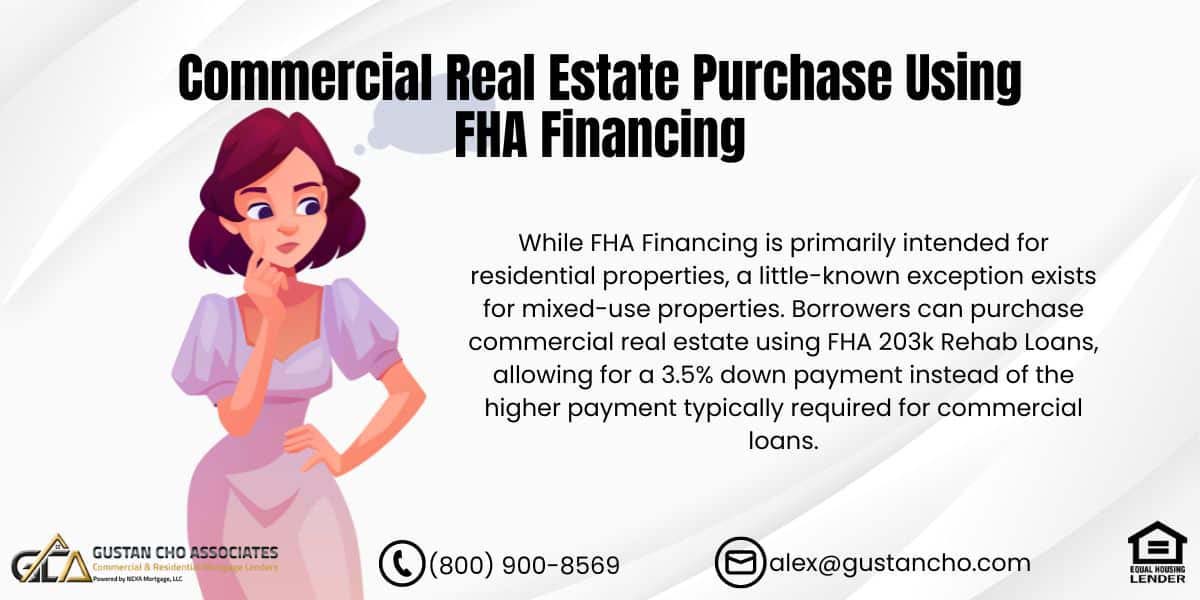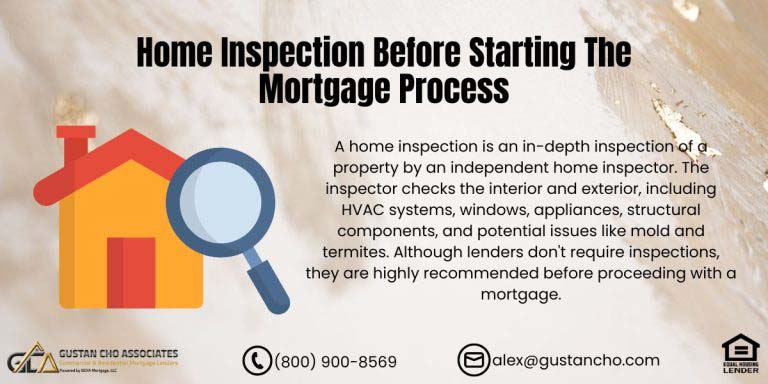In this blog, we will cover and discuss commercial real estate purchase using FHA financing. In the following paragraphs, we will give you tips on commercial real estate purchase using FHA financing. How can investors qualify for commercial real estate purchase using FHA financing? FHA financing is generally used for residential purchases and refinances.
Residential Versus Commercial Real Estate
Residential real estate encompasses properties designated for non-business purposes, including single-family homes or multi-family structures with up to four units, intended primarily for owner occupancy. FHA loans, renowned for their lenient terms and low down payment requirements, are widely favored in the United States.
They are particularly popular among first-time homebuyers, individuals with lower credit scores, a bad credit history, bankruptcy, foreclosure, or higher debt-to-income ratios. This article will dive into Commercial Real Estate Purchase Using FHA Financing.
About FHA Loans
In Commercial Real Estate Purchase Using FHA Financing, FHA loans feature lower mortgage interest rates than conventional mortgages. This advantage stems from the federal government’s (HUD) insurance, which safeguards lenders against borrower default and foreclosure losses.
Notably, FHA has recently reduced its annual mortgage insurance premium from 1.35% to 0.85%, rendering FHA’s mortgage insurance highly competitive with conventional private mortgage insurance.
What is Mortgage Insurance Premium?
A mortgage insurance premium (MIP) is a fee paid by borrowers who take out certain types of mortgages to protect the lender against the risk of default. It is commonly associated with FHA loans and some other government-backed mortgages.
For FHA loans, borrowers are required to pay an upfront MIP at the time of closing, as well as an annual MIP that is included in their monthly mortgage payments. The upfront MIP can be financed into the loan amount, while the annual MIP is paid as part of the ongoing mortgage payments. The purpose of MIP is to provide insurance coverage to lenders in case the borrower defaults on the loan, allowing lenders to recoup some or all of their losses.
The amount of MIP varies depending on factors such as the loan amount, the loan-to-value ratio, and the term of the loan. MIP rates are set by the government and can be adjusted periodically. MIP payments are typically required for the life of the loan, or until the loan is paid off, refinanced, or terminated through other means.
Want to Buy Commercial Property With FHA Financing? Here’s How
FHA loans are typically for residential—but mixed-use and live-in commercial properties may qualify.
Private Mortgage Insurance on Conventional Loans
Private Mortgage Insurance is not set at a fixed rate like FHA mortgage insurance premium. Mortgage Insurance Rates on Private Mortgage Insurance depends on the borrower’s credit scores and loan to value. If a conventional mortgage loan borrower has a 3% to 5% down payment home purchase conventional loan with credit scores under 680, then the chances are that their private mortgage insurance rate will be higher than 0.85%.
FHA is a great residential mortgage loan program. Now homebuyers can utilize commercial real estate purchases using FHA loans.
Should You Shop Around for a FHA Loan?
FHA loans are typically associated with residential properties rather than commercial ones. FHA (Federal Housing Administration) loans are designed to help individuals, particularly first-time homebuyers, purchase residential properties with more lenient qualifications and lower down payment requirements.
For commercial properties, you’d typically look into commercial real estate loans rather than FHA loans. These loans have different terms, requirements, and eligibility criteria than residential loans.
However, consider a mixed-use property (partially residential, partially commercial). In that case, you might explore FHA loans for the residential portion. However, you’d still need a commercial loan for the commercial part.
Shopping around for any loan, whether FHA or commercial, is generally a good idea. Compare lender rates, terms, and conditions to find your best financial fit. Each lender may have different offerings and be willing to negotiate terms, so exploring your options is wise.
What is a Commercial Bank Loan?
Commercial bank loans are loans provided by commercial banks to individuals, businesses, or other entities for different purposes, such as financing operations, purchasing assets, or covering expenses. Commercial banks are financial institutions that take client deposits and offer loans and other financial services.
Commercial bank loans can take many forms, including:
- Business Loans: These are loans provided to businesses for expansion, working capital, equipment purchases, or inventory financing.
- Personal Loans: Loans are available for personal expenses, such as renovating their homes, consolidating their debt, or pursuing education.
- Commercial Real Estate Loans: Loans are available for the acquisition, development, or remodeling of commercial real estate, such as office complexes, retail stores, or industrial plants.
- Lines of Credit: Borrowers can obtain funds up to a predetermined credit limit as required using these adaptable loan arrangements.
- Term Loans: Installment loans have a predetermined repayment period and regular payments at fixed intervals throughout the term.
Loans from commercial banks generally include repayment schedules, interest rates, and other conditions. The bank typically determines these terms based on factors like the borrower’s creditworthiness, the loan’s intended use, and current market conditions. As per the agreed terms with the bank, the borrower must repay the loan amount and interest.
Using FHA Loans For Commercial Real Estate Purchases
There is however a little-known exception to FHA’s narrow interpretation of that definition that allows borrowers to purchase commercial/residential (mixed-use) piece of real estate. Borrowers can purchase commercial real estate purchase using FHA Financing for a 3.5% down payment home purchase instead of the 25% to 30% for a commercial loan.
Yes. FHA will permit Commercial Real Estate Purchase Using FHA Financing on mixed-used properties using FHA 203k Rehab Loans.
Commercial Real Estate Purchase Using FHA Financing With FHA 203k Loans
A standard FHA insured mortgage loan (FHA 203B) will not allow a mixed-use commercial property as an approved property type to be eligible for FHA financing. Only FHA 203K (HUD’s renovation loan) will allow a purchase or refinance of a commercial/residential (mixed-use) property type.
If a borrower would like to purchase or refinance a piece of property combining both commercial and residential units (mixed-use) using the FHA 203k, it is possible under strict property type guidelines.
Buying a 2-4 Unit Property With a Business Space? FHA Might Work
Talk to an FHA Loan Specialist About Mixed-Use Financing Now!
FHA 203k Loan Eligibility on Commercial Real Estate
To become FHA 203k eligible, a mixed-use property must-have commercial portions (square footage) restricted to 25% for a four-story, 33% for a three-story and 49% for a two-story of the entire available floor area. An example would be in a two-story mixed-use property the residential space has to have the same square footage as the commercial space.
The stairs would be considered part of the residential space. Of course, the borrower had to live on the property. It’s still an FHA loan and FHA only lends to owner-occupants. Most times these types of properties are purchased by business owners that want the commercial portion for their business and then live in the residential portion.
What Can You Use On Renovation Funds on FHA 203k Loans
The renovation funds from the FHA 203k Loan can only be used for the residential portion of the property. You can use rental income for qualifying purposes. This means you can use future or existing rents on any additional units aside from the borrower’s unit as income. If the commercial space has a current tenant, this too can be used as income.
If the commercial space is not occupied and no rent is being paid, no income can be added. This is a great opportunity for anyone looking to purchase a commercial property for 3.5% down.
Getting Started With Qualifying For FHA Loan For Commercial Real Estate Property
This article on Commercial Real Estate Purchase Using FHA Financing was written by Alex Carlucci. Alex is also known by real estate and mortgage industry professionals as the King of FHA 203k Loan due to his expertise in FHA 203k Rehab Loans. Alex Carlucci is an expert on FHA 203k Loans and teaches FHA 203k Loan Courses to licensed realtors.
Real estate agents participating in Alexander Thomas Carlucci FHA 203k Loan Classes will get 3 hours of credit for their annual real estate CE requirements in the state of Illinois.
If you have any questions on commercial real estate purchase using FHA Financing or any questions on FHA 203k Loans or are a licensed realtor and like to arrange a special FHA 203k Loan class for your company, please do not hesitate to contact us at Gustan Cho Associates at 800-900-8569 or text us for a faster response. Or email us at alex@gustancho.com.
FAQs: Commercial Real Estate Purchase Using FHA Financing
- 1. What is FHA Financing, and how is it typically used? FHA Financing is a mortgage program the Federal Housing Administration offers, primarily used for residential purchases and refinances. It’s known for its low down payment requirements and is popular among first-time homebuyers and those with lower credit scores.
- 2. Can investors qualify for commercial real estate purchases using FHA Financing? While FHA Financing is primarily intended for residential properties, a little-known exception exists for mixed-use properties. Borrowers can purchase commercial real estate using FHA 203k Rehab Loans, allowing for a 3.5% down payment instead of the higher payment typically required for commercial loans.
- 3. What is the difference between residential and commercial real estate? Residential real estate is used for non-business purposes, such as single-family homes or multi-family properties for owner occupation. In contrast, the purpose of commercial real estate is for business use, including office buildings, retail spaces, or industrial facilities.
- 4. What is a Mortgage Insurance Premium (MIP), and how does it relate to FHA loans? For certain types of mortgages, such as FHA loans, borrowers must pay a fee known as MIP. This fee protects lenders from the potential risks associated with defaulting on the loan. This fee consists of an upfront payment at closing and an annual amount added to their mortgage payments.
- 5. How can I determine if a property is eligible for FHA Financing? Mixed-use properties must meet strict guidelines to qualify for FHA financing, including restrictions on the percentage of commercial space within the property. Additionally, renovation funds from FHA 203k Loans can only be used for the residential portion of the property.
- 6. Should I shop for an FHA loan for a commercial real estate purchase? While FHA loans are typically associated with residential properties, it is advisable to explore different lenders and loan options. To find the most suitable option for your commercial real estate purchase with FHA Financing, comparing rates, terms, and conditions is recommended.
- 7. How can I start qualifying for an FHA loan for a commercial real estate property? For further information on commercial real estate purchases using FHA Financing, including eligibility requirements and loan options, contact Gustan Cho Associates at 800-900-8569 or email alex@gustancho.com. Additionally, licensed real estate agents can arrange special FHA 203k Loan classes for their company through Gustan Cho Associates.
This blog about Commercial Real Estate Purchase Using FHA Financing was updated on April 12th, 2024.
Use FHA to Finance a Property That Works for You—Home + Business
See If Your Commercial Space Qualifies for FHA Financing










